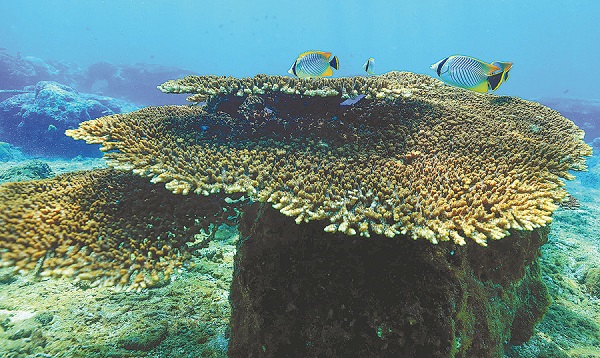Legal revision improves marine environment protection

Restored corals grow around reefs near Fenjiezhou Island, Hainan province. [Photo by Zhang Mao/China Daily]
China will ramp up environmental monitoring and impose more penalties for violations as the country strives to enhance marine conservation, according to a revision to the Marine Environment Protection Law.
The draft was passed on Tuesday after it was submitted to the Standing Committee of the National People's Congress for third reading.
The revision is problem-oriented and targets the principal contradiction and special problems facing marine preservation, according to a media release from the Legislative Affairs Commission of the NPC Standing Committee.
"It aims to further improve the quality of the marine environment by establishing institutions and improving existing ones," it said.
The revision stresses improving the capacity for marine environmental monitoring and governance with more advanced means and information technologies, stipulating that it's compulsory for governments of different levels and their departments to beef up capacity building in this regard.
Departments with the State Council, the country's Cabinet, as well as the coast guard authorities and governments above county-level in coastal regions should promote comprehensive, coordinated and regular environmental monitoring in the ocean, the revision stipulates.
They should also ramp up the sharing of information about marine environment management to improve marine protection capabilities, it adds.
Governments above county-level in coastal regions should also set up institutions for both the monitoring and cleaning of marine waste, it notes.
Aside from being tasked with specifying responsible government bodies, public institutions and enterprises for litter control in certain sea areas, the revision says, they are responsible for establishing systems to monitor, intercept, collect, transport and dispose of marine litter and taking measures to ensure their implementation.
To ratchet up marine radiation monitoring, the national environmental watchdog should hammer out a monitoring plan for emergency marine radiation monitoring and coordinate its implementation, the revision stipulates.
The country is also poised to improve its survey, monitoring, evaluation and preservation systems for marine biodiversity conservation, as well as to protect and restore key corridors for marine organisms.
Those who damage marine ecosystems, such as coral reefs and protected natural marine areas, will have to rectify their violations and take measures to remediate the damage, it rules. They will also be subject to penalties of 1,000 yuan ($137) to 10,000 yuan for every square meter of damaged area.
In preparing the draft, the NPC Standing Committee solicited suggestions from the public and NPC deputies, and held symposiums and organized investigation tours to Guangdong and Hainan provinces, said Xin Chunying, an official with the NPC's Constitution and Law Committee.
Passed in 1982, the Marine Environment Protection Law has been revised four times, with the last time in 2017. According to the NPC Standing Committee, the latest revision will come into force on Jan 1.
- Top legislature schedules standing committee session for late February
- China's top legislator meets with Uruguayan president
- Senior legislator surveys Anhui on formulating outline of provincial 15th Five-Year Plan
- China's top legislator meets with British PM
- NPC deputies see more engagement with top court



